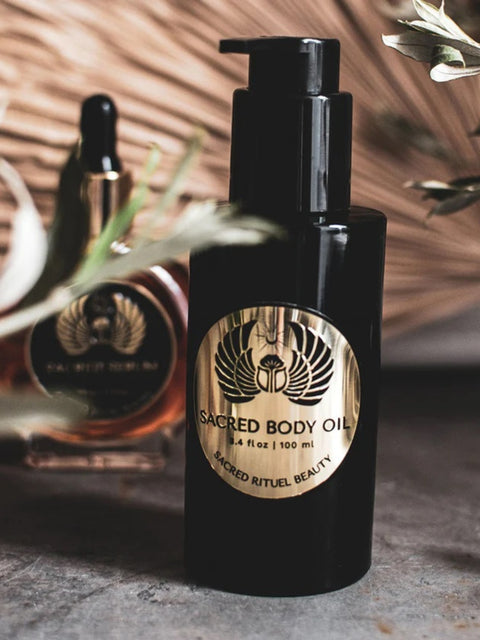
Why Organic Beauty Products Are Better For Your Skin
Key Takeaways:
- Natural Formulation: Organic beauty products are formulated with natural ingredients that are free from harmful chemicals and synthetic additives.
- Skin Health Benefits: These products provide numerous benefits for skin health, including hydration, nourishment, and reduced irritation.
- Environmental Sustainability: Transitioning to organic beauty products supports a healthier skincare routine and contributes to environmental sustainability.
At Sacred Rituel, we pride ourselves on creating high-potency, all-organic skincare solutions designed to nourish, repair, and protect your skin using only the finest natural ingredients. Our commitment to quality and sustainability is reflected in every product we offer, ensuring your skin receives the best care possible.
Organic beauty products have surged in popularity as consumers become more conscious of the ingredients in their skincare. Unlike conventional products, which often contain synthetic chemicals and preservatives, organic beauty products are formulated with natural ingredients that are free from harmful substances. These products are designed to work in harmony with your skin, providing gentle yet effective care.
Using organic beauty products means embracing a skincare routine that prioritizes health and well-being. These products are rich in vitamins, minerals, and antioxidants that support skin health, reduce inflammation, and promote a radiant complexion. Furthermore, organic farming practices used to cultivate these ingredients help protect the environment and promote sustainability.
In this piece, we will be discussing why organic beauty products are better for your skin, focusing on the benefits they offer, harmful ingredients to avoid in non-organic products, and tips for transitioning to an organic skincare routine.
Understanding The Ingredients In Organic Beauty Products
One of the primary distinctions between organic and non-organic beauty products lies in the ingredients used. Organic beauty products are formulated with natural ingredients that are free from synthetic chemicals, pesticides, and genetically modified organisms (GMOs). These ingredients are often sourced from organic farms where sustainable and eco-friendly practices are prioritized:
Plant Extracts
Many organic beauty products rely on plant extracts like aloe vera, chamomile, lavender, and green tea. These extracts are rich in vitamins, antioxidants, and essential oils that nourish and protect the skin. Aloe vera soothes and hydrates, chamomile reduces inflammation, lavender offers calming benefits, and green tea provides potent antioxidants.
Natural Oils
Organic products frequently use natural oils such as coconut oil, jojoba oil, argan oil, and rosehip oil. These oils provide deep hydration, help to maintain the skin's moisture barrier, and offer anti-inflammatory properties. Coconut oil is excellent for its moisturizing capabilities, jojoba oil mimics skin's natural sebum, and argan oil is known for its high vitamin E content and anti-aging benefits.
Essential Oils
Essential oils like tea tree oil, lavender oil, and eucalyptus oil are common in organic skincare. They not only add a pleasant fragrance but also offer therapeutic benefits such as antibacterial and calming effects. Tea tree oil is effective against acne, lavender oil helps soothe irritated skin, and eucalyptus oil provides antiseptic properties.
Butters And Waxes
Ingredients like shea butter, cocoa butter, and beeswax are used for their moisturizing and protective properties. They create a barrier that locks in moisture and shields the skin from environmental stressors. Shea butter is rich in vitamins A and E, cocoa butter helps to improve skin elasticity, and beeswax forms a protective layer on the skin.
Natural Preservatives
Organic products use natural preservatives such as vitamin E, rosemary extract, and grapefruit seed extract to extend shelf life while avoiding harmful synthetic preservatives like parabens. Vitamin E acts as an antioxidant, rosemary extract has antimicrobial properties, and grapefruit seed extract helps maintain product freshness without irritating the skin.
Transform your skincare routine with Sacred Rituel’s high-potency, all-organic beauty products. Crafted with the finest natural ingredients and a commitment to sustainability, our products nourish, repair, and protect your skin, offering a holistic approach to beauty and well-being. Experience the difference of truly organic skincare and embrace a healthier, more radiant complexion. Join us on a journey to elevate your skincare with the purity of nature.
Benefits Of Using Organic Beauty Products For Your Skin
Organic beauty products offer a multitude of benefits for your skin, contributing to a healthier and more radiant complexion. Here are some of the key advantages:
Gentle On The Skin
Organic products are free from harsh chemicals, synthetic fragrances, and artificial colors that can irritate the skin. This makes them ideal for individuals with sensitive skin or conditions like eczema and rosacea. The natural ingredients used in organic products tend to be soothing and less likely to cause adverse reactions.
Nutrient-Rich Formulations
Organic beauty products are often packed with vitamins, minerals, and antioxidants derived from natural sources. These nutrients help to nourish the skin, promote cell regeneration, and protect against environmental damage. For example, ingredients like vitamin C from citrus fruits can brighten the skin and reduce signs of aging.
Reduced Risk Of Allergic Reactions
Since organic products avoid synthetic chemicals and preservatives, there is a lower risk of allergic reactions and skin sensitivities. Natural preservatives and ingredients are generally more compatible with the skin’s natural chemistry.
Anti-Aging Properties
Many organic ingredients, such as green tea, aloe vera, and rosehip oil, contain antioxidants that combat free radicals. Free radicals can accelerate the aging process by breaking down collagen and elastin in the skin. Using products rich in antioxidants can help maintain a youthful appearance and improve skin elasticity.
Environmental Benefits
Choosing organic beauty products also supports environmental sustainability. Organic farming practices reduce pollution, conserve water, and enhance soil health. By opting for organic products, you contribute to a healthier planet while taking care of your skin.
Holistic Skin Health
Organic beauty products often embrace a holistic approach to skincare, focusing on overall skin health rather than just addressing specific issues. Ingredients like lavender oil and chamomile not only benefit the skin but also provide aromatherapy benefits, promoting relaxation and stress relief.
Transparency And Trust
Many organic beauty brands prioritize transparency and ethical practices. They often provide detailed information about their sourcing and production methods, allowing consumers to make informed decisions and trust the products they use.

Common Harmful Ingredients In Non-Organic Beauty Products
Non-organic beauty products often contain a variety of synthetic chemicals and additives that can be harmful to your skin and overall health. Here are some common harmful ingredients to watch out for:
- Parabens: Parabens are commonly used as preservatives in cosmetics to prevent the growth of bacteria and mold. However, they have been linked to hormonal disruptions and have been found in breast cancer tissues, raising concerns about their safety.
- Sulfates: Sulfates, such as sodium lauryl sulfate (SLS) and sodium laureth sulfate (SLES), are used as foaming agents in shampoos, cleansers, and body washes. These ingredients can strip the skin of its natural oils, leading to dryness, irritation, and an imbalance in the skin's pH levels.
- Phthalates: Phthalates are often used to enhance the flexibility and longevity of fragrances in beauty products. They are known endocrine disruptors and have been linked to reproductive and developmental issues.
- Formaldehyde and Formaldehyde-Releasing Agents: Formaldehyde is a known carcinogen used in some beauty products as a preservative. Additionally, certain chemicals, such as DMDM hydantoin and quaternium-15, can release formaldehyde over time, posing health risks.
- Synthetic Fragrances: Fragrances can contain hundreds of synthetic chemicals, many of which are undisclosed due to proprietary laws. These can cause allergic reactions, skin irritation, and other health issues such as headaches and respiratory problems.
- Artificial Colors: Artificial colors, often listed as FD&C or D&C followed by a number, are derived from coal tar and petroleum. They can cause skin irritation and have been linked to hyperactivity in children and potential carcinogenic effects.
- Triclosan: Triclosan is an antimicrobial agent found in some soaps and toothpaste. It can contribute to antibiotic resistance and has been linked to hormonal disruptions and environmental toxicity.
- Mineral Oil and Petrolatum: These petroleum-derived ingredients are used as moisturizing agents. They can create a barrier on the skin that clogs pores, leading to acne and other skin issues. Additionally, they may contain impurities that are potential carcinogens.
- Toluene: Toluene is used in nail polish and hair dyes. It is a volatile petrochemical solvent that can affect the respiratory system, cause skin irritation, and has been linked to immune system toxicity and developmental damage.
Avoiding these harmful ingredients by choosing organic beauty products can help protect your skin from potential damage and health risks. In the next section, we will discuss how to choose the right organic beauty products for your skincare needs.
How To Choose The Right Organic Beauty Products
Selecting the right organic beauty products can be overwhelming given the plethora of options available. Here are some tips to help you make informed choices that align with your skincare needs:
Check For Certification
Look for products certified by reputable organizations such as USDA Organic. These certifications ensure the products meet stringent organic standards and contain a high percentage of organic ingredients, giving you confidence in their purity and quality.
Read The Ingredients List
Examine the ingredients list carefully. The best organic beauty products will have a short, easy-to-understand list of ingredients. Avoid products with long lists of unpronounceable chemicals, even if they claim to be organic, to ensure you are getting genuinely natural ingredients.
Identify Your Skin Type And Concerns
Choose products tailored to your specific skin type and concerns. For instance, if you have dry skin, look for products with hydrating ingredients like aloe vera, shea butter, or coconut oil. For acne-prone skin, consider products with tea tree oil, witch hazel, or naturally derived salicylic acid.
Look For High-Quality Ingredients
Prioritize products with high-quality, nutrient-rich ingredients. Ingredients such as jojoba oil, argan oil, chamomile, and calendula are known for their beneficial properties and can address various skin issues effectively, enhancing the overall health and appearance of your skin.
Avoid Common Irritants
Even natural ingredients can cause allergic reactions in some individuals. Conduct a patch test before using a new product to ensure it doesn’t irritate your skin. Avoid products with potential irritants like essential oils if you have sensitive skin to minimize the risk of adverse reactions.
Research The Brand’s Philosophy
Investigate the brand’s commitment to sustainability and ethical practices. Brands that prioritize eco-friendly packaging, cruelty-free testing, and fair trade sourcing are often more trustworthy and aligned with organic principles, ensuring your skincare choices are ethical and sustainable.
Consider Reviews And Testimonials
Look for reviews and testimonials from other users to gauge the effectiveness and safety of the product. Real-life experiences can provide valuable insights into how the product performs on different skin types and conditions, helping you make a more informed decision.
Understand The Product Labels
Familiarize yourself with common organic and natural labels. Terms like “natural,” “eco-friendly,” and “green” are not regulated and can be misleading. Certifications and a clear ingredients list are more reliable indicators of a product’s quality, ensuring you know exactly what you are applying to your skin.
Trial And Error
Finding the perfect organic beauty product may require some experimentation. Start with sample sizes or trial kits to test how your skin responds before committing to full-sized products. This approach allows you to find products that truly work for your skin without unnecessary waste.
Tips For Transitioning To Organic Beauty Products
Making the switch to organic beauty products can be a rewarding journey for your skin and overall well-being. Here are some practical tips to help you transition smoothly:
- Start Gradually: Switching all your beauty products at once can be overwhelming. Begin with the essentials, such as your cleanser, moisturizer, and sunscreen. Gradually replace other products as you run out of them.
- Patch Test New Products: Before incorporating a new product into your routine, conduct a patch test. Apply a small amount of the product on your inner wrist or behind your ear and wait 24-48 hours to check for any adverse reactions.
- Educate Yourself: Take time to learn about the ingredients and benefits of organic products. Understanding what you’re applying to your skin will help you make informed choices and appreciate the value of organic skincare.
- Listen to Your Skin: Pay attention to how your skin reacts to new products. Organic products may initially cause minor breakouts or adjustments as your skin detoxifies from previous chemical-based products. This is often temporary and should improve over time.
- Hydrate and Nourish from Within: A healthy skincare routine goes beyond topical products. Drink plenty of water, eat a balanced diet rich in fruits and vegetables, and get adequate sleep. These practices support your skin’s health from the inside out.
- Seek Professional Advice: If you’re unsure about which products to choose, consider consulting with a dermatologist or skincare professional who is knowledgeable about organic beauty products. They can provide personalized recommendations based on your skin type and concerns.
- Simplify Your Routine: Focus on quality over quantity. A simple skincare routine with a few high-quality organic products can be more effective than a complex regimen with multiple products. Cleanse, moisturize, and protect your skin with sunscreen as the basic steps.
- Be Patient: Transitioning to organic beauty products is a process. Give your skin time to adjust and show improvements. It may take a few weeks to see noticeable changes, so be patient and consistent with your new routine.
- Join a Community: Engage with online communities or local groups that share your interest in organic beauty. These communities can offer support, product recommendations, and tips based on their experiences.
By following these tips, you can make a smooth transition to organic beauty products and enjoy the benefits of a healthier skincare routine. In the next and final section, we will summarize the key points and emphasize the importance of embracing a healthier skincare routine.

Final Thoughts
Switching to organic beauty products is more than just a trend—it's a commitment to a healthier lifestyle and a more sustainable planet. By choosing products formulated with natural, nutrient-rich ingredients, you can enhance your skin's health, reduce exposure to harmful chemicals, and contribute to environmental well-being.
Transitioning to organic beauty products can be a gradual and rewarding process. By educating yourself, listening to your skin, and starting with the essentials, you can seamlessly incorporate organic products into your daily routine. Remember, the journey to healthier skin is not just about what you apply on the outside, but also how you nourish and care for your body from within.
Embracing organic beauty products means prioritizing your skin's health and supporting sustainable practices that benefit the environment. Whether you're new to organic skincare or already a dedicated user, continuing to seek out high-quality, certified organic products will help you maintain a radiant and healthy complexion for years to come.
Read also:
- Superfoods for Beauty & Reversing Aging
- Green Tea for Longevity and Beauty: The Guide You Need
- From Vitamin A to Vitamin E: The Nutrients For Beauty, Health and Longevity
Frequently Asked Questions About Organic Beauty Products
What are organic beauty products?
Organic beauty products are skincare and cosmetic items made from natural ingredients that are grown without synthetic pesticides, fertilizers, or genetically modified organisms (GMOs). They prioritize natural, eco-friendly practices.
How do organic beauty products benefit sensitive skin?
Organic products are free from harsh chemicals and synthetic fragrances that can irritate sensitive skin. They use gentle, natural ingredients that soothe and nourish, reducing the risk of allergic reactions and irritation.
Are organic beauty products more effective than non-organic ones?
Effectiveness varies by product, but organic beauty products often contain higher concentrations of active, nutrient-rich ingredients that can provide superior hydration, protection, and anti-aging benefits.
Can organic beauty products help with acne?
Yes, many organic beauty products contain natural antibacterial and anti-inflammatory ingredients like tea tree oil and aloe vera that can help reduce acne and soothe inflamed skin.
What should I look for on labels when choosing organic beauty products?
Look for certifications such as USDA Organic, a short and recognizable ingredient list, and avoid products with synthetic chemicals, parabens, and artificial fragrances.
Do organic beauty products have a shorter shelf life?
Organic products may have a shorter shelf life due to the absence of synthetic preservatives. However, natural preservatives like vitamin E and essential oils are often used to extend their longevity.
Are organic beauty products environmentally friendly?
Yes, organic products typically use sustainably sourced ingredients and eco-friendly packaging, reducing environmental impact and promoting biodiversity.
How can I transition to using organic beauty products?
Start by replacing essential items like cleansers and moisturizers, conduct patch tests for new products, and gradually incorporate more organic items into your routine as you finish existing ones.
Are organic beauty products safe for all skin types?
Generally, yes. Organic products are formulated to be gentle and are suitable for all skin types, but it's still important to choose products tailored to your specific skin needs and conduct patch tests.
How do I know if a beauty product is truly organic?
Check for certifications from recognized organic standards, read ingredient lists for natural components, and research the brand's commitment to organic and sustainable practices.
Sources:
- Schagen, S. K., Zampeli, V. A., Makrantonaki, E., & Zouboulis, C. C. (2012). Discovering the link between nutrition and skin aging. Dermato-Endocrinology, 4(3), 298–307. https://doi.org/10.4161/derm.22876
- Kim, S., & Seock, Y.-K. (2009). Impacts of health and environmental consciousness on young female consumers’ attitude towards and purchase of natural beauty products. International Journal of Consumer Studies, 33(6), 627–638. https://doi.org/10.1111/j.1470-6431.2009.00817.x
- Cervellon, M.-C., & Carey, L. (2011). Consumers’ perceptions of “green”: Why and how consumers use eco-fashion and green beauty products. Critical Studies in Fashion & Beauty, 2(1), 117–138. https://doi.org/10.1386/csfb.2.1-2.117_1







Comments (0)
There are no comments for this article. Be the first one to leave a message!